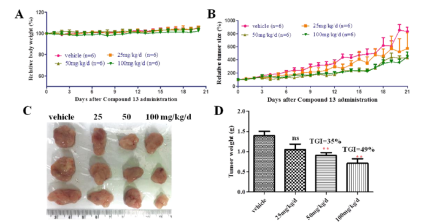
A recent study conducted in High Magnetic Field Laboratory, Chinese Academy of Sciences (CHMFL) reported a new kind of inhibitors for gastrointestinal stromal tumor (GIST) with high kinase c-KIT selectivity.
As a common malignant gastrointestinal tumor, gastrointestinal stromal tumors is mainly treated by combination of surgery and drugs at present, which can achieve good therapeutic effect. Currently, medical profession encourages the use of targeted drugs for consolidation of treatment. Pathological study demonstrates that kinase c-KIT is a validated gastrointestinal stromal tumor treatment target.
For kinase c-KIT, two drugs have been approved to treat gastrointestinal stromal tumor, Gleevec (imatinib) and Sutent (sunitinib). However, the two drugs are multi-target kinase inhibitors of which the side effects have attracted a lot of attentions. Meanwhile, Imatinib strongly inhibits the activity of the kinase BCR-abl, which will cause great potential cardiactoxicity and Sunitinib inhibit both c-KIT and FLT3, which leads to strong suppression of bone marrow toxicity. Therefore, drugs based on highly selective kinase c-KIT inhibitors are more ideal for gastrointestinal stromal tumors.
In view of this, Professor LIU Qingsong and Professor LIU Jing’s group in CHMFL developed a new generation of highly selective kinase c-KIT inhibitors CHMFL-KIT-110 which can strongly inhibit the kinase c-KIT phosphorylation (IC50=99nM).
CHMFL-KIT-110 shows inhibitory effect neither to BCR-abl characteristics cell lines K562 nor to FLT3 characteristics cell lines Tel-FLT3-BaF3. In the kinome profiling assays (468 human kinase), CHMFL-KIT-110 shows few off-target (s score (1) = 0.01), which indicates its high selectivity.
Pharmacokinetics study showed that CHMFL-KIT-110 has good pharmacokinetic parameters, the oral half-life of rats is 4.11 hours, and the absolute bioavailability of oral administration is 36%. In the mouse gastrointestinal stromal tumor model, CHMFL-KIT-110 shows a significant inhibitory effect on the growth of gastrointestinal stromal tumors (100mg/kg/day, 21day: TGI=49%).
The research results have been applied to China's invention patent (Patent No.: 201610210424.X), and now the project is under innovative drug development with Hefei Cosource Pharmaceutical Inc. Anhui. The results were published in Journal of Medicinal Chemistry.
This research was supported by the Scientific Research Grant of Hefei Science Center of CAS, the grant of “Cross-disciplinary Collaborative Teams Program for Science, Technology and Innovation” from Chinese Academy of Sciences, Anhui Province Natural Science Foundation Annual Key Program, China “Thousand Talent Program”, "Hundred Talent Program” of the Chinese Academy of Sciences and the National Natural Science Foundation of China.

Chemical structure and biological data of CHMFL-KIT-110 (Compound 13) (Image by WANG Qiang and ZOU Fengming)

The effect of CHMFL-KIT-110 to GIST xenograft model. (Image by WANG Qiang and ZOU Fengming)

86-10-68597521 (day)
86-10-68597289 (night)

52 Sanlihe Rd., Xicheng District,
Beijing, China (100864)

